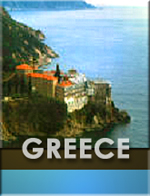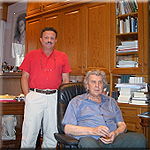An Island of Faith By Israel Shamir |
I write on a balcony overlooking the azure sea and a fresh red rose shares my company with a few cats. Mt Athos, this green wooded island stretching into Aegean Sea, an independent Christian nation under Greek protectorate, home to twenty massive abbeys is a tranquil paradise; the place where hundreds of monks and thousands of lay pilgrims pray to Lord, work the land, grow heavy olives and red apples.
|
|
|
 |
Mt. Athos |
|
Esoteric Orthodox Christianity is a well hidden secret of Greece – people are aware of Zorba the Greek and of sunny islands, but if they would know they would come here with their spiritual search, not to Sufis or Zen Buddhists; as besides being wonderful this faith is easier accessible for a Westerner. The monks are learned men; some hail from Australia and Russia, France and Palestine. The abbot Vasileios studied in Lyon; he appreciates Pindar and Dostoyevsky.
This is a good place to recognise an unknown victim of the Iraqi war: Christianity. Its reputation is besmirched by people who take the name of Christ – and of fundamentalism – in vain. From the NY Times to the FrontPage magazine, various Judaic publications provide an outlet for anti-Muslim rant, for calls to war in the name of Conflict of Civilisations. As the result, some Muslims began to answer by counter-attacking Christianity; and the European and American youth learns to think of their faith as of
danger to mankind. However, this victim is innocent: true Orthodox Christendom, as fundamentalist as it can be, firmly rejects the creed of Mammon and the US war on Islam.
Fundamentalist is one who follows the traditional teaching of the Church. The sacred texts have no meaning outside of tradition. The adversaries try to appeal to the texts by taking them out of tradition, but the tradition is alive and it can’t be deconstructed into composite elements, de-contextualised and used at
will; the elements can be understood in context only, being fully contextualised by Church tradition.
There are no stricter fundamentalists than the monastic community of Mt Athos in Northern Greece, where I write these words. Athos is a great reservoir of spirit, and many people come to partake of its waters. (Charles, the Prince of Wales stays in an abbey, too.) The monks keep the fire of Christian faith as it was kindled by Christ and his apostles. They do not expect their
salvation will come from Jews, as it already came in the person of Christ. They feel no need to seek Rupture for they were given a plan of their own: to try and bring the Second Coming by means of prayer and spiritual enlightenment. For them, the Second Coming is the mystic experience of seeing Christ in his glory, and it is attainable by divine grace. The church is a device that helps believers to see Him. She also guards the believer from being misled by cunning sophisms and subterfuge.
The roots of the Greek Church go beyond the first mission of St Paul to Athens, for he recognised the religious zeal of the Hellenes. They did not need to be converted, but enlightened. Simone Weil wrote of Hellenic premonitions of Christ so apparent in the Iliad. In her view, the Greeks were Christians before Christ; and their influence on Christianity was paramount. Even today, Greeks are devoted to Christ, to His Mother and to their own Mother Church, the ancient Orthodox Church established by SS John and Paul.
Their church stays out of politics, but exercises moral influence. Guided by her church, Greece does not participate in the Iraqi war, her sons do not die on the streets of Baghdad; and this most religious, most Christian nation shares the view of good Muslims and ours, that the world including Greece is threatened - not by Islamic terrorism, but by the US fight against terrorism. Greece is a rare place where a Western dissident feels spiritually at home, as your average Greek thinks the
thoughts known to rare Western intellectuals, readers of Chomsky and Baudrillard. Their immensely popular Archbishop Christodoulos correctly stated that terrorism is caused by the “injustice and inequality that pervades the world.”
In The Wall Street Journal, a Zionist Greek Takis Michas, in a piece called Is Greece a Western Nation?, complains that only 10% of Greeks think that Greece should give military support to the US in its attack “against states harbouring
terrorism”; majority thinks that Osama bin Laden is a creation of CIA propaganda. The Zionist concludes with horror: “Such views seem to have more in common with public opinion in Cairo or Damascus than in Berlin or Rome.” So much for the silly concept of conflict between Christendom and Islam promoted by these guardians of the Christian faith, the Wall Street Journal and the New York Times!
|

|
|
Theodorakis and Shamir,
in Athens 2004 |
|
|
As opposed to the West, the Greeks knew neither hatred nor fear of Jews. They saved many of their Jews during the German occupation, and treated them fairly. As they had their own national church, they did not transfer their spiritual values to Jews for safekeeping; and thus had no reason to bewail the loss of them. Where is no guilt, there is no fear, either. The renowned Greek composer Mikis Theodorakis was
sarcastically asked by his Israeli interrogator whether, in his view, the Jews pull the strings from behind George Bush. He dashingly answered:
|
|
“No. They are in the front.” “America, the great superpower, is actually controlled today by the Jews?” – asked the inquisitor before pronouncing his verdict. “Yes”, replied Mikis, the man who has more Jewish friends than an average American.
Where is no fear of Jews, there is no automatic support for the US, either, and Theodorakis’ view that “the root of evil today is the policy of President Bush” rather than the Muslim world is shared by
many Greeks. Greeks know Muslims not from books – they lived in close quarters with them for a millennium. They are aware that their long and troubled relationship with their Turk neighbours reached its nadir under the anti-Islamic rule of Mustafa Kemal Ataturk, while Islamic Sultan Selim the Grim spent a fortune restoring the monasteries of Athos. Muslim communities are well integrated in Greece, as the national church is quite tolerant to religious minorities and to its big non-religious population.
Now, both the Greek Left and the Greek Right are united in their rejection of the Judeo-American drive to conquer the East, to enforce multiculturalism and to separate the Church and the State. They support the Palestinians and wish the Jews to come to their senses. They are a good example for US fundamentalists. Indeed, Greece is the proof that fundamentalist Christianity is not that of George Bush, and that the alternative to him is not monopolised by the First Lesbian Synagogue of New York.
In his ‘thought police’ report in the Wall Street Journal, Takis Michas describes the sins of the Greeks: “in the 1980s, they harboured organizations perceived as terrorist in the West, and opposed the Reagan administration's deployment of Cruise and Pershing missiles in Europe. Following the collapse of communism in Eastern Europe, the anti-American narrative came to be adopted by the political Right. American policies in Bosnia and Kosovo were widely seen as aiming to destroy the church,
while the overthrow of Slobodan Milosevic - celebrated all over the world - was seen as a CIA plot.”
Michas’ report on Greeks appeared soon after the much-anticipated book by Diana Johnstone, Fools' Crusade: Yugoslavia, NATO and Western Delusions which demolished the faked “evidence” of Serb atrocities in Kosovo. Today we know that the world
had no reason to celebrate the overthrow of Milosevic – or indeed, of Saddam Hussein. But the Greeks understood this earlier, when it was the opinion of only a small enlightened minority in the West. How come -- why were the Greeks better than the Western intellectuals at recognising these media lies for what they were?
The reason, in my view, is the traditional character of the Greek Orthodox Church and of its connection to the people and to their state. Separation of Church
and state, this much vaunted accomplishment of the French revolution and even more of the US founding fathers, cut off the anchors of the Western society and it drifted straight towards the rocks. While in France the national Catholic Church still occupies an important and exclusive place, the US, the country without a state church, became a victim and a servant of Mammon. The small, independent churches of the US had no ability to form the mind of the nation; they competed for an outlet in the Jewish-owned media; they were forever
threatened by tax authorities; they broke with tradition and became prey for the wolves.
This absence of one church further undermines the underlying concept of unity-in-God, elaborated by T S Eliot in The Christian Idea of Society (1939). People live together united by an idea; this idea may (or indeed should) be their common worship and uniting communion. This need for one national church that unites its people by a single communion was manifested in Eliot’s decision to remain
a member of the national Anglican Church while adhering to the Catholic dogma. In Palestinian context, Eliot would prefer an ‘Islamic state’ to a secular one.
The US was a first experiment of a large scale: what will happen to a society that is built on the pursuit of profit, instead of on the rock of faith. The fathers-founders could read the story of the Chinese sage Mencius (372-289 BC). He went to see the King Hui who said: “Old man, since you dared the distance of 1000 li
to come here, you may know of a way to profit my state.” Mencius replied: “why should you ever mention the word ‘profit’? What counts is benevolence and righteousness. If the King says ‘How can I profit my country?’ the high officials will say, ‘how can we profit our fiefs?’, and the intellectuals and the commoners will say: ‘How can we profit ourselves?’ If the upper and lower classes strive to snatch profit one from another, the state will be endangered.”
Indeed, this is what happened in the US, and under its influence it increasingly happens elsewhere. Whether nationalist or socialist constructs were far from perfect, they offered some semblance of solidarity, denied by profit-seekers. But Greece convinced me: none could improve on the national church, which is fully national and fully integrated in the ring of churches.

